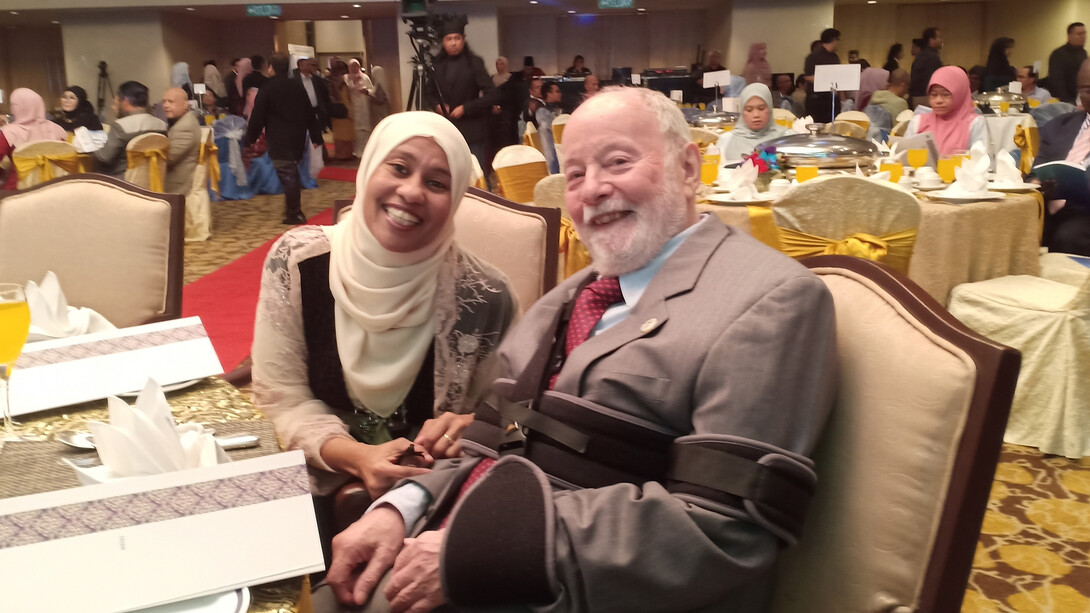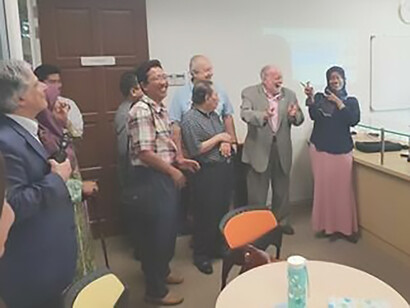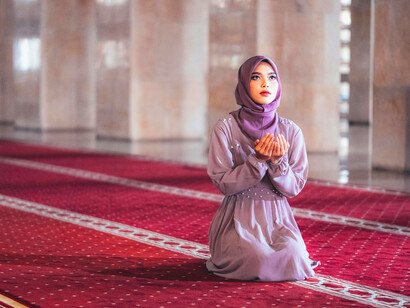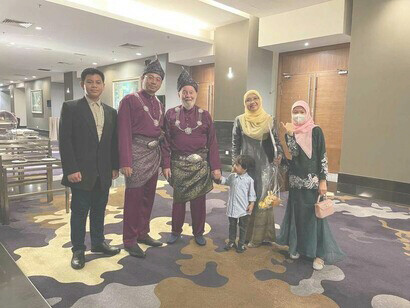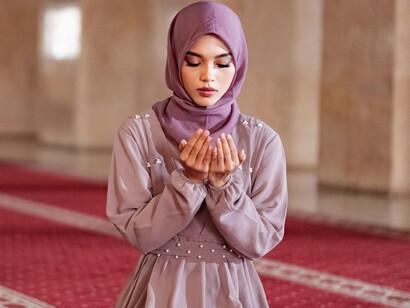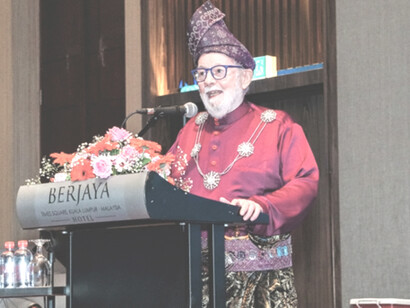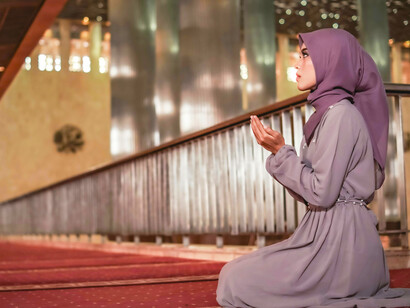A wide-reaching discussion stitched together into this article on stress and coping mechanisms, trust, talent management, Maslow’s hierarchy of needs, and biotechnology, with an overall focus on Article 28 of the Universal Declaration of Human Rights. The embroidery belongs to Dr. Shadiya Mohamed S. Baqutayan; a stitch in time is mine. I like to think that this is a journey and an outcome of my concept Eurasian Bridges for Peace, which until now has taken the direction from west to east, and now we have a reversal of direction from east to west... From that bridge together, how would you like to begin?
With a quote from the Universal Declaration of Human Rights that says, "Everyone is entitled to a social and international order in which the rights and freedoms outlined in this Declaration can be fully realized."
And from the Quran:
And those who emigrated for the cause of Allah, after they had been wronged, We will certainly give them good residence in this world; but indeed, the reward of the Hereafter will be greater—if they but knew.
(Qur’an 16:41)
Are the quotes and verse dreams? Dreams deferred? Realizable goals? Talk me through them.
This verse was revealed about the early Muslims in Makkah who faced persecution for their faith. Unable to practice Islam freely, they first migrated to Abyssinia and later to Madinah. Their hijrah was not just a physical move from one place to another; it represented a significant spiritual and psychological change. It marked a strong break from oppression towards the chance for moral freedom and spiritual integrity. The believers who left their homes did so not for comfort but to defend their conscience.
Both the Universal Declaration of Human Rights and the Qur’anic verse express humanity’s longing for justice, dignity, and freedom. The Declaration envisions a world where everyone can fully enjoy their rights; this ideal is still pursued but not yet achieved. The Qur’an honors those who endure injustice for a noble cause, promising them both worldly refuge and eternal reward. Together, they connect human effort with divine assurance: justice is not a distant dream but a goal we can reach. However, when neglected, these ideals risk becoming dreams postponed. This serves as a reminder that moral and social progress depends on our willingness to act with faith and responsibility.
How would you interweave this verse with your present migration?
When I think about this verse, I see a reflection of my own journey. My life, like the path of those early believers, has been shaped by moments of displacement, change, and renewal. Although I did not migrate under forced circumstances, it still carried the same spiritual meaning: the search for peace, knowledge, dignity, and staying true to one’s purpose. Leaving one’s homeland and adjusting to a new culture is not just a geographical shift; it is a deep psychological process of redefining oneself. It takes courage to rebuild one’s identity while staying connected to the moral and spiritual values that ground the soul.
In this context, migration becomes more than just movement. It serves as protection and renewal, an ongoing journey of faith and self-discovery. It offers a chance to rebuild life with integrity and faith after facing challenges or being separated from what feels familiar. My current migration is not only physical; it represents a state of grace where patience, perseverance, and faith in divine justice transform hardship into growth. The verse reminds me that even when the world's systems fail to offer fairness, there is still a promise of goodness in this life and a greater reward ahead for those who hold on to their values and continue their journey with hope.
Throughout my life journey, I have moved from Yemen to Saudi Arabia, then to Malaysia, and now I live in Spain. I have learned how freedom, faith, and belonging connect in complex but meaningful ways. Each society has its own view of freedom. In some, faith shapes public identity, while in others, it remains private. Both views have their strengths, but they can become fragile when freedom is misunderstood. This misunderstanding can occur through claims of superiority or indifference to belief. Through these different experiences, I have come to see that true freedom is not just the absence of restraint but the presence of moral purpose. When freedom is separated from conscience, it leads to chaos. When it is connected to compassion and justice, it becomes a foundation for peace.
This understanding is important in psychology because autonomy is essential for well-being. Just as early believers found strength in their faith despite hardships, people today do better when they can make meaningful choices that reflect their values. Freedom of conscience is not a privilege; it is a psychological need, as vital to the mind as oxygen is to the body. Without justice, whether social or spiritual, human dignity suffers. When institutions or governments fail to protect this moral space, they break more than laws. They erode the trust that supports human relationships and communities. Trust is the unseen bond that connects societies; without it, cooperation weakens and social harmony breaks down.
This moral understanding is reflected in Article 28 of the Universal Declaration of Human Rights. It states, “Everyone is entitled to a social and international order in which the rights and freedoms set forth in this Declaration can be fully realized.” This article is one of the ways that sparked our collaboration!
This article is not just a political statement; it shows a deep psychological and spiritual need. People thrive only in places where they feel secure, respected, and valued. Justice is not just about how systems are built; it is a condition of the soul. When individuals live under systems that support fairness, empathy, and equity, they find meaning and purpose. When these systems fail, people face confusion, alienation, and moral exhaustion. The Qur’anic verse and Article 28, although from different traditions, share the same truth—that dignity, justice, and freedom are essential parts of human life.
My studies in psychology have consistently confirmed this idea. Human development depends not only on physical or intellectual support but also on moral and emotional security. Where trust and fairness exist, people develop creativity and compassion. Where oppression dominates, the mind shrinks, leading to fear and resentment. My research suggests that the ability to handle life’s challenges relies on feeling valued and treated fairly. Coping is not just a passive endurance of suffering; it actively transforms it. It is a process of turning pain into wisdom and resilience into strength.
My own experiences with migration have deeply shaped my understanding. Moving between countries, languages, and cultures required constant adjustment, but it also strengthened my inner self. What seemed like hardship at first became a source of insight. Each transition involved learning new systems and staying true to my authenticity and faith. Through these experiences, I started to see coping as a form of spiritual intelligence. It is the ability to stay at peace inside while facing challenges outside. This inner stability allows people to turn adversity into personal growth. Writing became my way of reflecting and turning emotions into understanding. Teaching became my way of serving, sharing personal struggles as collective knowledge.
Shadiya, this part of you became obvious to me when I first entered one of your classes in Kuala Lumpur and interacted with you and your creative students. You were then attached to the Perdana School of Science, Technology, and Innovation Policy at the Technology University, Malaysia. At the time, I presented the United Nations University of Peace in Europe to the university administration. I also presented my concept of Eurasian Bridges for Peace.
Yes, this vision was shaped by important meetings, especially with you (Professor Jeffery Levett), a philosopher who connects Eastern and Western thought. We first met during World Philosophy Day 2018 in Kuala Lumpur, an event that encouraged dialogue across disciplines and cultures. Later, these meetings became key moments, expanding my understanding of how philosophical and psychological views work together in the pursuit of human well-being. Our discussions showed that education is not just about sharing knowledge; it also involves building ethical awareness. Knowledge without compassion is empty. Education that combines empathy and critical thinking unites civilizations.
When we met again the following year on World Philosophy Day 2019, I presented my paper titled “Love to Live in Peace.” I argued that peace begins with emotional honesty and grows into social harmony. I suggested that peace is not just the absence of conflict but also the mastery of compassion during conflict. This belief still guides my teaching and research. It reminds me that the goal of education is not only academic success but also the development of moral clarity and psychological balance. In this view, education, freedom, and coping are not separate areas; they are parts of human dignity that support each other. Education sharpens the mind, freedom defends conscience, and coping nurtures the soul. Together, they create a solid foundation for individuals and societies to thrive.
Between 2018 and 2019, two concepts coalesced, namely, we had found a way to place the work of Dr. Halo’N within the Eurasian Bridges for Peace project, and I saw you as providing an asset to it. It was helped by the fact that one of your students was part of the effort.
Between 2018 and 2019, two important ideas came together through Dr. Halo’N’s work on the Eurasian Bridges for Peace project. Although I was not directly involved in the initiative, I felt proud knowing that one of my students, Mohammad Nizar Mat Nor, took part in this meaningful effort. His participation reflected the values I want to instill in my students: intellectual curiosity, empathy, and a commitment to building understanding across cultures. In this way, my role as an educator found indirect expression in the project’s goals. It reaffirmed my belief that education goes beyond the classroom and inspires contributions toward peace and mutual respect.
Throughout my personal and professional journey, I often think about what motivates people to keep moving forward, even in tough times. Maslow’s hierarchy of needs explains human motivation by suggesting that people move from basic survival to self-actualization. However, my experiences challenge this idea of a strict order. Even during hard times, creativity and growth can happen when driven by faith and purpose. On the other hand, having wealth without moral guidance leads to emptiness. Psychological growth is not just a straight path; it is dynamic and driven by meaning and connection as much as by safety and success. True well-being is not about avoiding struggle but about finding purpose.
The lessons I have learned from these experiences show that coping involves balancing inner peace with outside involvement. It means choosing clarity instead of confusion, purpose rather than distraction, and empathy over reaction. In times of rapid change, uncertainty, and displacement, this psychological balance is essential. Maintaining moral and emotional consistency during chaos helps individuals make a positive impact on their surroundings. Migration represents this journey toward coherence. It is an ongoing process of moving from fragmentation to unity.
Reflecting on my own journey, I can tell you that I had arrived at something akin to self-actualization long before I came to know Maslow!
Reflecting on my journey from Yemen to Spain, I see that migration, faith, education, and freedom all share one main goal: human dignity. Each step of displacement and adaptation has strengthened my belief that dignity does not depend on status or situation; it comes from actively practicing compassion, trust, and integrity. The Qur'anic promise of "a good residence in this world" refers not just to physical comfort but also to inner peace—the calm that arises from living according to the truth.
Through years of teaching, research, and personal reflection, I have come to realize that the heart of education is compassion; it fosters understanding. The heart of freedom is trust; it keeps human connection alive. The heart of coping is peace; it helps reconcile the heart with the world. These are not separate virtues. They are interconnected forces that shape the richness of human life. To live meaningfully means to blend them in thought and action, turning every challenge into a step toward wisdom. The journey that began in Yemen, grew in Saudi Arabia, deepened in Malaysia, and continues in Spain is not just a series of moves. It is a continuous spiritual adventure. In this journey, faith transforms into understanding, and understanding turns into service.
Ultimately, the Qur’anic verse and the principle in the Universal Declaration of Human Rights affirm that the journey toward dignity is both earthly and eternal. Those who migrate in search of justice, knowledge, and faith are promised not just external safety but also internal peace. Accepting this truth means recognizing that every act of endurance can lead to transformation. Migration symbolizes the soul’s journey toward wholeness. It serves as a reminder that the path itself, when guided by faith and supported by integrity, is the true reward.
Shadiya, you have an interesting story to tell. It represents a continuous spiritual adventure. You can't go home again, even though you have a valid passport! You have the closing word.
I can’t go home again. Indeed, my journey has turned into a continuous spiritual adventure. Even though I have a valid passport, I can’t go home again, because "home" is more than just a place. It represents peace, safety, and dignity, which, as we all know, Yemen cannot fully provide right now. My search for inner and outer peace has taken me far beyond geographical borders. It has shown me that true belonging is not tied to a country but to the values, purpose, and faith that guide my life. Every challenge and every step of migration has offered an opportunity for renewal, resilience, and growth. Migration is not just a change of place; it is a movement of the soul toward meaning, hope, and the promise of a better world.
